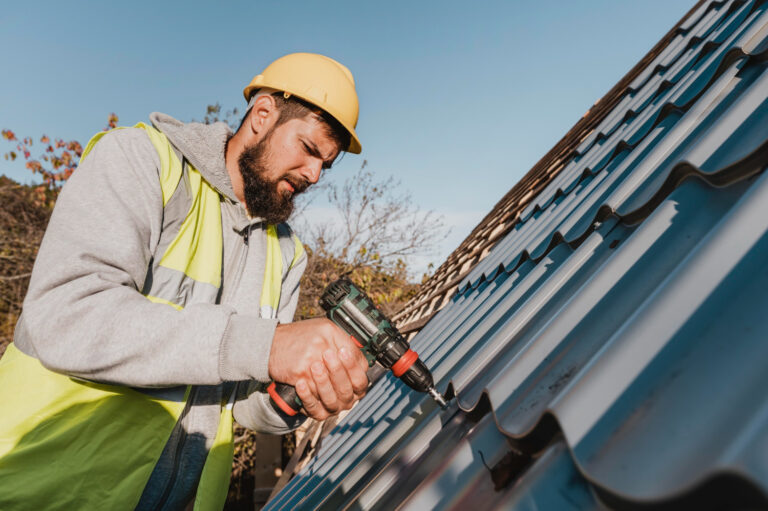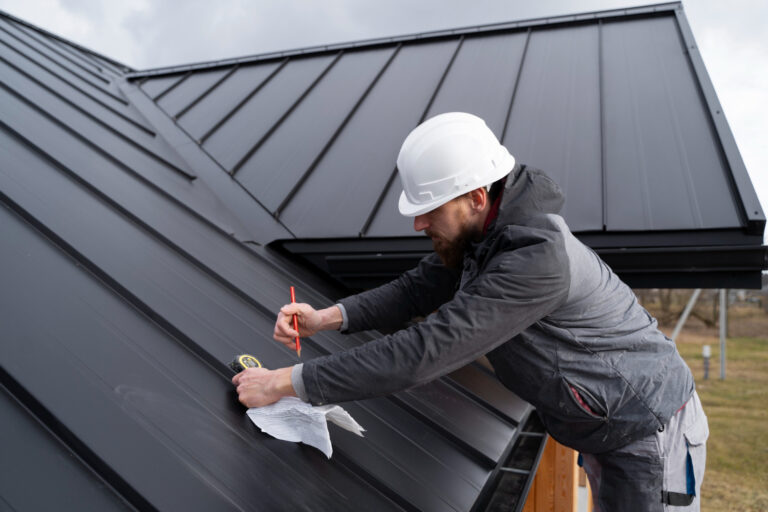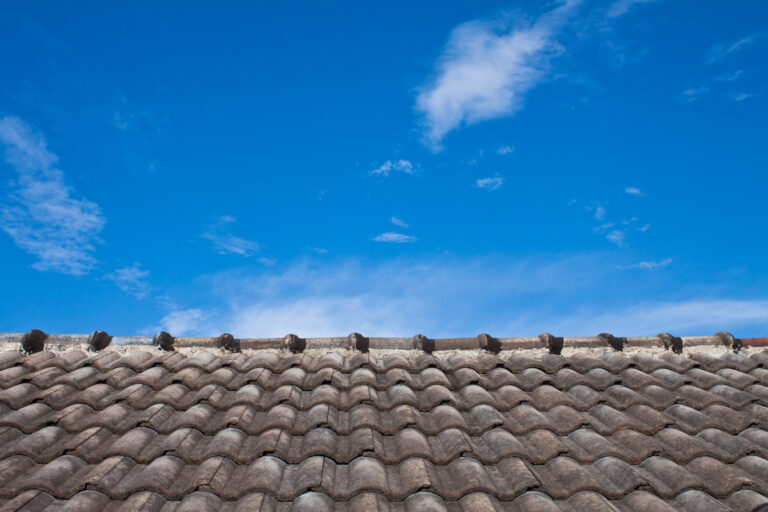Your roof is your home’s first line of defense against the elements, but over time, it can suffer from wear and tear. To ensure your roof stays in good shape, regular inspections are essential. Whether you’re a homeowner, a property manager, or a real estate agent, knowing when and how to schedule a roof inspection can save you from costly repairs or replacements down the road. In this blog, we’ll dive into why roof inspections are crucial, what to expect during the inspection, and how they can benefit your property.
1. Why Roof Inspections Matter
Roof inspections are essential for maintaining the integrity of your home. Here are some of the reasons why regular roof inspections are crucial:
- Early Detection of Problems: Roof inspections can identify issues before they become serious. Small leaks, damaged shingles, or blocked gutters may go unnoticed, but a thorough inspection can spot these issues early, preventing costly repairs.
- Extend Roof Life: Regular inspections help ensure that your roof is in the best condition possible. By identifying problems early and performing maintenance, you can extend the life of your roof, delaying the need for a replacement.
- Preserve Home Value: A well-maintained roof is a major selling point for your home. If you’re planning to sell your house, a recent roof inspection can show potential buyers that the roof is in good condition, adding value to your property.
- Insurance and Warranty Requirements: Some insurance policies or roofing warranties may require proof of regular inspections. Without them, you might risk voiding your coverage or warranty if problems arise.
- Safety Concerns: A damaged or aging roof can pose safety hazards. Leaks, mold, or structural damage can cause health risks or further damage to your home. Inspections help ensure that these issues are addressed before they become a danger.
2. When Should You Schedule a Roof Inspection?
The frequency of roof inspections can depend on several factors, including the age of your roof, the climate you live in, and any recent storms or damage. Here are some key times to schedule an inspection:
- After Major Storms: If your area has experienced a significant storm, it’s a good idea to schedule a roof inspection. Strong winds, hail, or heavy rain can cause damage that isn’t always visible from the ground.
- Annually: For most roofs, an annual inspection is recommended to catch small issues before they escalate. This is especially important for older roofs or homes in areas with harsh weather conditions.
- Before Buying or Selling a Home: If you’re in the process of buying or selling a home, a professional roof inspection is an essential step. This ensures you know the condition of the roof and can avoid unexpected repair costs.
- If You Notice Warning Signs: If you notice signs like water stains on your ceiling, loose or curling shingles, or an increase in your energy bills, it’s time to schedule an inspection. Early detection can help you address the problem before it worsens.
3. What to Expect During a Roof Inspection
A roof inspection typically involves a thorough visual inspection of both the interior and exterior parts of the roof. Here’s a breakdown of what a professional roofer will look for:
- Exterior Inspection: The roofer will check for visible damage to shingles, tiles, or metal roofing materials. They will look for signs of wear, such as cracking, curling, or missing pieces. The flashing, gutters, and downspouts will also be inspected for proper function.
- Interior Inspection: The inspector will check your attic for any signs of leaks or moisture. Water stains, mold, or mildew can indicate a leaky roof or poor ventilation. They may also check the insulation to ensure it’s not compromised by moisture.
- Gutter and Drainage Check: Gutters are an essential part of your roof’s health. The inspector will ensure that gutters are clean, functional, and directing water away from the foundation.
- Flashing and Ventilation: Flashing around chimneys, skylights, and vents is critical for keeping water from seeping into your roof. The inspector will check these areas to ensure there are no gaps or signs of wear. Proper ventilation is also checked to prevent moisture buildup, which can lead to mold and rot.
- Structural Inspection: A good roofer will also look for structural issues such as sagging, bowing, or signs of wear in the roof’s framework. These can indicate serious problems that need to be addressed immediately.
4. How to Choose the Right Roofing Professional for an Inspection
Not all roofing professionals are created equal, so it’s important to choose someone you can trust. Here are some tips for finding the right roofer for your roof inspection:
- Check Credentials: Ensure the roofer is licensed and insured to perform inspections. This protects you and ensures the work meets local building codes.
- Experience and Expertise: Choose a roofer with experience in your specific type of roof and the local climate. Roofing professionals who specialize in your area’s common roofing materials (e.g., asphalt shingles, metal roofing, etc.) will have the necessary expertise.
- Reputation: Read reviews and ask for referrals from friends, family, or neighbors. A reputable roofing professional will have positive feedback and a solid track record.
- Written Estimates: Always get a written estimate before scheduling an inspection. This should outline the cost of the inspection and any potential follow-up services, such as repairs.
- Look for a Roof Certification: If you plan to sell your home soon, some roof inspectors offer a roof certification. This certificate can provide peace of mind to potential buyers, ensuring them that the roof is in good condition.
5. Roof Inspection Costs
The cost of a roof inspection can vary depending on factors like the size of your roof, its condition, and your location. On average, roof inspections typically range from $100 to $300. However, some contractors may offer free inspections if you hire them for repairs or other services afterward.
While the cost may seem like an extra expense, it’s a small price to pay compared to the cost of major roof repairs or replacements that could arise from neglected maintenance.
6. Conclusion
Regular roof inspections are a critical part of home maintenance. They help detect issues early, extend the life of your roof, and keep your home safe from leaks and other damage. By scheduling an inspection after major storms, on an annual basis, or whenever you notice potential problems, you can avoid expensive repairs and ensure your roof remains in good condition for years to come.
Don’t wait until a small problem becomes a big one—schedule a professional roof inspection today to protect your home and your investment!




12 thoughts on “Understanding Roof Inspections: Why They Matter and What to Expect”
http://terios2.ru/forums/index.php?autocom=gallery&req=si&img=4543
https://myteana.ru/forums/index.php?autocom=gallery&req=si&img=6678
https://mazda-demio.ru/forums/index.php?autocom=gallery&req=si&img=6564
Very good https://is.gd/tpjNyL
http://terios2.ru/forums/index.php?autocom=gallery&req=si&img=4737
https://honda-fit.ru/forums/index.php?autocom=gallery&req=si&img=7288
Игорь Кибирев – Я Укрою Тебя От Дождей скачать и слушать песню https://shorturl.fm/6CES9
Андрей Корнеев – Я и ты скачать песню и слушать бесплатно https://shorturl.fm/mL3Oo
Gercek – Глупый, Молодой скачать песню и слушать онлайн https://shorturl.fm/AY3uX
Johnyboy feat. Thrill Pill – Одна Ночь скачать mp3 и слушать бесплатно https://shorturl.fm/jlHW0
Валерия Кожевникова – К Нему скачать mp3 и слушать онлайн https://shorturl.fm/HmEjU
6677betlogin, huh? That’s a mouthful! Hope the login process is easier than saying the name. Looking for a reliable spot to gamble. 6677betlogin